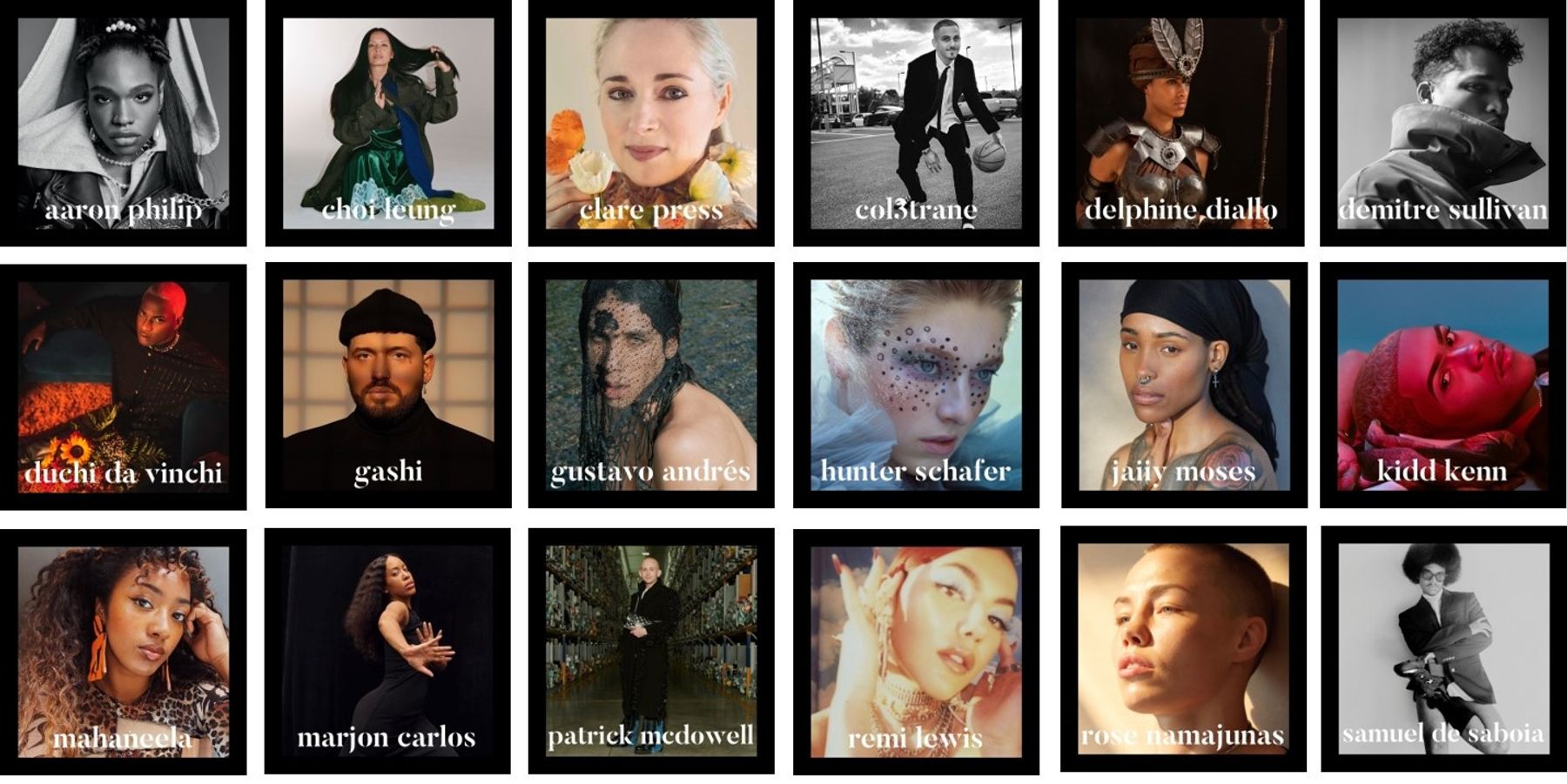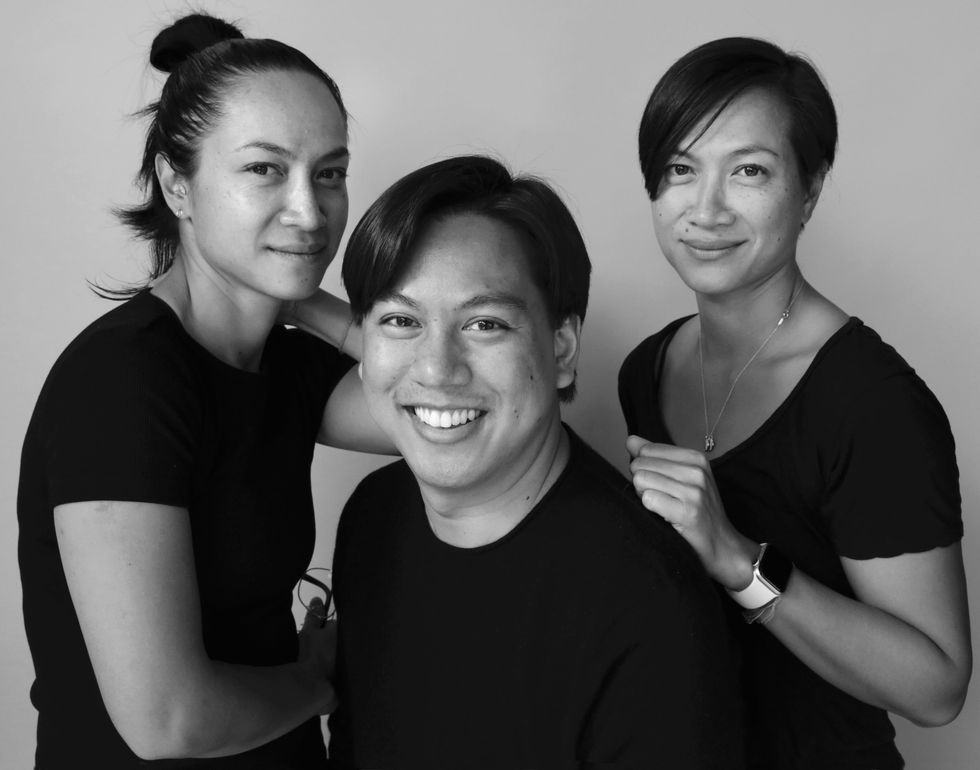
Fashion
The Talent Agency Creating a Safe Space for Queer, Immigrant and POC Voices
30 November 2020

For decades, the world's most successful models (i.e. white and thin) belonged to a handful of top agencies whose names are almost as famous in fashion circles as the talent they represent. But as the demand for LGBTQIA+ models and other marginalized communities across fashion, film and entertainment continues to grow, a new wave of boutique agencies dedicated to giving queer and POC voices greater visibility is starting to emerge.
Agencies like New Pandemics, who primarily represent queer models, and Zandwagon, who champion "unconventional beauties," are just some of the companies that have popped up in recent years that are working to disrupt the modeling industry. Community New York, which quietly launched this year, is the newest entrant on the scene but hardly one lacking in star power.
With a roster that includes model/activist Aaron Philip, musician Kidd Kenn, actress Hunter Schafer, producer Vagabon, journalist Marjon Carlos, designer Patrick McDowell and Brooklyn-based rapper Gashi, Community New York bills itself as a safe space for its diverse community of talent (or "catalysts" as they call them) that encompass queer, immigrant and POC voices.
The agency was formed by three first-generation immigrants from Laos — Butterfly Cayley, Moe Lamstein and Richie Keoall — all of whom bring over 23 years of experience working at places like DNA and Elite Model Management. Together they've helped launch and manage the careers of famous fashion names like Mariacarla Boscono, Doutzen Kroes and Natalia Vodianova.
PAPER caught up with the trio to discuss their new venture, the experiences working in the modeling industry and how they plan to help a new generation of creatives achieve proper representation.

Moe Lamstein, Richie Keo and Butterfly Cayley
The three of you have decades of experience working for some of the top modeling agencies in the world. At one point in your careers did you see a void in the market as well as an opportunity to strike out on your own?
Butterfly Cayley: I started my career at DNA, so more like in the high fashion world, where I stayed for 15 years and helped build the company when we had nobody. It was like a startup too and it's a fantastic agency now. I definitely learned a lot. And then I worked at a photographic agency and even worked in magazines a little bit. But for the past three years, the three of us worked together at Elite. Richie and I actually met at DNA. And then we went over to Elite. Early on we started to see the industry changing, where clients wanted a little something with more substance, something that people can relate to and identify with. And then with the pandemic, we just felt like it all escalated so quickly and brands were looking for change and new ideas.
Richie Keo: The change that we saw was that your standard typical supermodel that I think we all grew up with in the '90s and the '00s was no longer that, right? Like you started to see it evolving into the Kendall's and the Gigi's and the Kaia's and whatnot. We felt like there was a space there to really build what is now the new supermodel. That it wasn't just a pretty face or a girl who fit the traditional measurements. We want to represent individuals who have a story who are inspiring to us who aren't sort of your typical empty vessel, and what goes along with that is representation and ensuring that all communities are represented. So that's why we have a writer. That's why we have a chef. That's why we have a sustainable fashion designer, and we can find clever ways to collaborate together.
Having left the corporate world, how are you approaching conducting business with clients and working with your roster of talents as a small, boutique agency?
Butterfly: It's definitely more creative in that we actually have the time now to sit down or Zoom. Everything is really built around the talent. And it speaks volumes. It's very different from going to a huge corporation like an Estée Lauder, for example, and going to their CEOs and pitching a model where you're filling a slot or a face. Where you go with someone like a Hunter or something where there's a storyline, there's a lot more substance there. And for her to be like the ambassador or the face, it's definitely more exciting.
Richie: I also think a big difference between a big corporate company versus a smaller business like ourselves, is that we're able to decide how we lead and how we run the company, and I think that we're able to leap a little bit more with empathy and compassion. Not to say that agents don't have that, but I think when you run a business those big corporate companies sort of lose that a little bit. And this is where we can kind of take it back down to earth and bring it back home.
Being that you're all first-generation immigrants from Laos, what's it been like navigating a predominantly white business?
Moe Lamstein: We've all worked very hard to be where we are now. No one handed us anything. But has it been challenging? Yes. But I would say the industry is very accepting.
Butterfly: I mean, I have to say, yes, this industry in entertainment is accepting, however, we're behind the scenes. So that's a different thing. But also like in the 20 years plus of being in this industry, I had never met another Laotian person until I met Richie and then randomly, and usually when people ask where you're from and you tell them, they're like, Where's that? What is that? You know? So it's like, Oh it's the country next to Thailand. It's like, it feels kinda unknown. But yeah, it's been an experience and I do think fashion is very accepting when it comes to those things, they love a success story.
Moe: As people of color, and growing up as first-generation immigrants, we didn't really have role models to look up to, to be like, Wow, I can do that. You know what I mean? So that was really important to us to be able to have someone to identify with, even one of us or whatever, it's like we all came to New York with dreams and aspirations.
What are some of the things you guys look for when helping to facilitate projects between brands and your talent to make sure it aligns with their values?
Richie: The way that I think that each of us manage is fairly similar, and we don't look at brands as a whole, for the entire roster of talent that we have. I think everything is carefully curated and individualized to every single talent that we represent. I think we also operate in a way of full disclosure and transparency when it comes to working with any brands and any of our talent. We would like to provide as much information as possible to them. We feel knowledge is power, and it's important to provide that to the talent, to really give them the power and empower them to decide who they want to work with.
There's been a lot of discourse this year about companies needing to be held more accountable behind-the-scenes and being more transparent about their internal diversity efforts. Being that you guys are small and are able to provide that kind of attention, what have been some of the ways you're practicing what you preach?
Butterfly: The whole thing is our talent is going to come with us because they feel comfortable with us. And it's just because it's just the three of us, there's no one else, there's no assistants, there's no interns or whatever, you know? We are a boutique agency. Of course we want to grow, but when we grow, staff will grow as well. So we are very selective of who we take and about the amount of talent we take because we want to make sure everyone's comfortable and serviced. And we have really open conversations with them.
Richie: As human beings I think are always learning, and as we continue to work with such a diverse group of talents, we're learning with each and every one of them. And I think that the way that we approach any conversation is with the mentality that we're here to listen, and we're here to learn as well, too. Not to say that, you know, we are obligating them to educate us, but I think that that's important as well too. And that's how, as a small company who just started a month ago, we will continue to craft and devise the mission and the plan of how we lead and how we manage, you know, as we do grow and then pass that on to other employees. I think that's important as well, too, and I think that's how you create a safe space.
Finally, as this year comes to a close, where you think the industry is headed and how do you guys see yourselves being part of the conversation in the months ahead?
Richie: I think for us, we definitely have a mentality of focusing more in the digital space and digital activations because I just don't think that it's going to be back to the norm of what we used to see where you'd have talent working five days a week on set shooting e-com or catalog. I think that's also a big part of the reason why we wanted to part away from the traditional modeling agency and represent sort of standard models that do those kinds of jobs. I think there will definitely always be a space there for them. I just think that the piece of the pie is just much smaller.
Butterfly: I think we're so different in that we're not just a talent agency like a CAA, or modeling agencies like the IMGs and whatever, because we are a boutique and it's very curated and you see the roster, there's definitely an aesthetic there, and we like to push the boundaries. It's our idea of beauty and we want to share that. If it doesn't push the envelope, we're not interested. We want to represent those trailblazers that makes history in its own kind of way. So I think that sets us apart. I don't think we'll ever be like a huge corporate company. I mean, maybe, but I doubt it, because we just have such a different vision from all that, and that was what we had in our path and that's what we did.
Moe: 2021 will be a time for us to be creative. It puts us in an exploratory space and we created this to be able to have that freedom to do so.Photos courtesy of Community New York